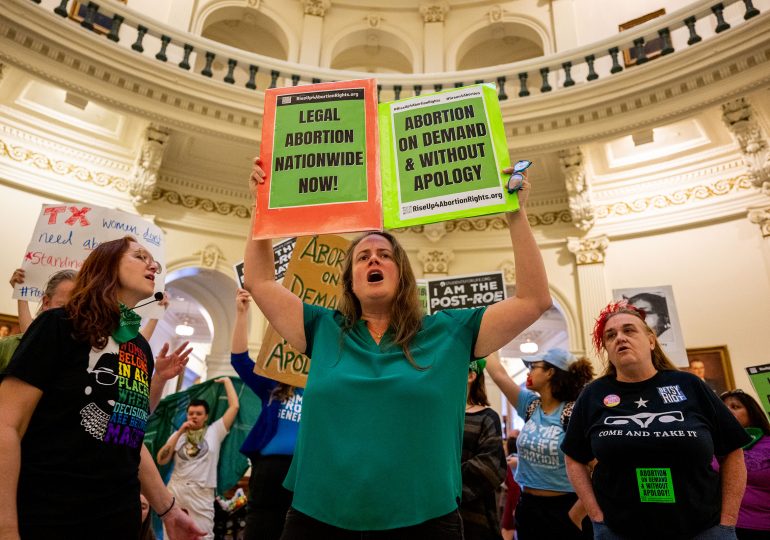A Texas woman filed an emergency lawsuit on Tuesday to ask the state for permission to have an abortion.
Kate Cox, a 31-year-old mother of two filed a temporary restraining order and permanent injunction, asking the court to allow her to terminate her pregnancy at 20 weeks because she received a diagnosis of a fatal fetal condition. Dr. Damla Karsan, a board certified OB/GYN who would perform the abortion on Cox if permitted, is the second plaintiff in the lawsuit.
[time-brightcove not-tgx=”true”]
The case is the first of its kind in 50 years, and heralds a burdensome new legal strategy for pregnant people navigating the complex legal landscape of abortion after the Supreme Court overturned Roe v. Wade last year.
Texas has one of the most restrictive abortion laws in the U.S., prohibiting abortion beginning at six weeks, before many women know they are pregnant. Cox’s case seeks both to obtain an abortion and to clarify exceptions to Texas’ abortion restrictions, which could resolve some ambiguity for patients and doctors and pave the way for women in other states with abortion bans to file similar suits..
“The court is being invited into this agonizing decision-making that this woman is having in choosing between the health of her life and the future of her living children,” says Missy Owen, co-chair of the National Association of Criminal Defense Lawyers’ Criminalization of Reproductive Health Taskforce. “She is opening the doors for the court, saying, ‘I do not want to be committing a crime, but the situation in front of me is impossible.’”
What is the case about?
In Cox v. Texas, the plaintiffs are asking the court to allow Karsan to perform an abortion on Cox because her fetus has Trisomy 18, also called Edwards syndrome. The condition causes abnormalities—Cox’s baby, the lawsuit says, has a “spine abnormality,” umbilical hernia, clubbed foot, and other conditions.
Cox’s physicians have recommended an abortion. Children with Trisomy 18 have a greater risk for miscarriage or stillbirth and research shows that only 1 in 2 babies who are carried to term will be born alive. Most only survive for a few days, and only about 90-95% of babies do not live beyond the first year, the Minnesota Department of Health reports.
According to the case filing, Cox is currently 20 weeks pregnant and has been to three different emergency rooms because of “severe cramping and unidentifiable fluid leaks.” Cox is also at higher risk for complications because she previously had two Cesareans, has elevated glucose levels, and other underlying health conditions.
Cox is filing the case to ask that the court clarify its abortion regulations. The case filing says that Cox cannot wait for the Texas Supreme Court to release its decision on a separate lawsuit, Zurawski v. Texas. That case, filed in March, asks the court to clarify under which medical exemptions OB/GYNs could perform abortions. A Travis county judge previously ruled that patients who have medical issues that could threaten their life, or have a lethal fetal diagnosis, should be exempt from existing abortion regulations. But Texas Attorney General Ken Paxton appealed that ruling.
Stakes of the case
Nicholas Kabat, an attorney for the Center for Reproductive Rights, which filed the case, says this lawsuit is not looking to overturn all of the state’s abortion bans, but asks for greater clarification of when physicians can perform an abortion.
If the court rules in Cox’s favor, that means she would legally be able to terminate her pregnancy. It also means that the physician who performs the abortion, and her spouse—who could be held liable for aiding an abortion under Texas S.B. 8—would not face punishment. However, legal experts warn that there is still the possibility that someone will appeal the decision, which would delay Cox from accessing an abortion.
But the stakes go beyond Cox and her family. University of Virginia School of Law professor Naomi Cahn notes the lawsuit could help other pregnant people who live in states with similar abortion bans. “It would show them that it might be possible for them to get an abortion,” Cahn says.
Even if the court rules in Cox’s favor, barriers would remain for many women to employ a similar strategy. Finding legal representation can be costly and difficult. There also can be an emotional and physical toll to seeking an abortion through the judicial system: “The notion that anyone would have to publicly advocate to a court their personal circumstances to be able to get justification feels like a violation,” says Owen. “That she (Cox) would have to file on a docket in a courthouse where anybody can read the complaint and it can be plastered all over every publication in America…that’s an enormous sacrifice.”
Kabat says this has been difficult for Cox. “Imagine that you are grieving the loss of a very desired pregnancy. Kate wants to carry. She has two children, and she wanted to have a third,” says Kabat. “So she’s grieving a loss of a pregnancy and at the same time, she’s being told by her doctors that she needs to end this pregnancy now in order to be able to have kids in the future.”
There’s added time pressure on cases like these as the pregnancy progresses. “The consequence of the state’s strategy here is that in the middle of a time-sensitive and devastating pregnancy crisis, a woman like Kate may have to be forced out of state,” Kabat says. “This is a situation where she’s not only facing potential loss for fertility, but life threatening risks. And the state cannot force a woman to take on those risks just because the state is opposed to abortion.”

















